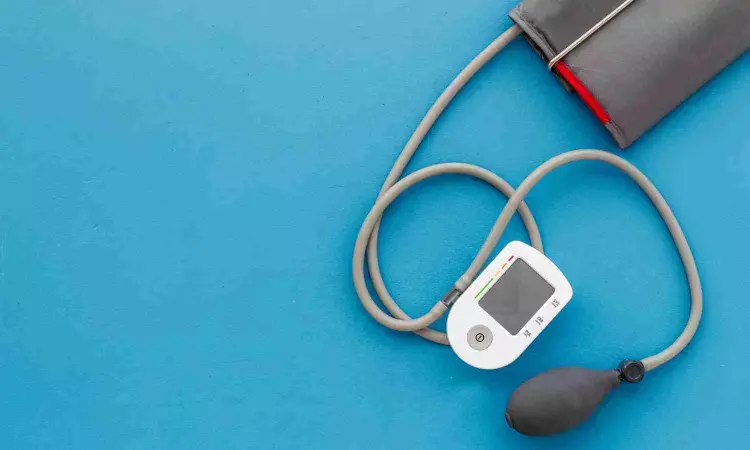- Home
- Medical news & Guidelines
- Anesthesiology
- Cardiology and CTVS
- Critical Care
- Dentistry
- Dermatology
- Diabetes and Endocrinology
- ENT
- Gastroenterology
- Medicine
- Nephrology
- Neurology
- Obstretics-Gynaecology
- Oncology
- Ophthalmology
- Orthopaedics
- Pediatrics-Neonatology
- Psychiatry
- Pulmonology
- Radiology
- Surgery
- Urology
- Laboratory Medicine
- Diet
- Nursing
- Paramedical
- Physiotherapy
- Health news
- Fact Check
- Bone Health Fact Check
- Brain Health Fact Check
- Cancer Related Fact Check
- Child Care Fact Check
- Dental and oral health fact check
- Diabetes and metabolic health fact check
- Diet and Nutrition Fact Check
- Eye and ENT Care Fact Check
- Fitness fact check
- Gut health fact check
- Heart health fact check
- Kidney health fact check
- Medical education fact check
- Men's health fact check
- Respiratory fact check
- Skin and hair care fact check
- Vaccine and Immunization fact check
- Women's health fact check
- AYUSH
- State News
- Andaman and Nicobar Islands
- Andhra Pradesh
- Arunachal Pradesh
- Assam
- Bihar
- Chandigarh
- Chattisgarh
- Dadra and Nagar Haveli
- Daman and Diu
- Delhi
- Goa
- Gujarat
- Haryana
- Himachal Pradesh
- Jammu & Kashmir
- Jharkhand
- Karnataka
- Kerala
- Ladakh
- Lakshadweep
- Madhya Pradesh
- Maharashtra
- Manipur
- Meghalaya
- Mizoram
- Nagaland
- Odisha
- Puducherry
- Punjab
- Rajasthan
- Sikkim
- Tamil Nadu
- Telangana
- Tripura
- Uttar Pradesh
- Uttrakhand
- West Bengal
- Medical Education
- Industry
Higher blood pressure associated with poorer cognition in adolescence, States study

Adolescents with elevated blood pressure and arterial stiffness may experience poorer cognitive functions, according to a recent Finnish study conducted at the University of Jyväskylä and the University of Eastern Finland. Young people with higher blood pressure performed worse, especially in tasks that measured attention and learning. In addition, arterial stiffness was reflected in weaker working memory. In view of the findings, the importance of preventing high blood pressure and arterial stiffness in childhood and adolescence is emphasized.
It is well-established that poor arterial health can lead to cognitive decline in adults. However, there is limited knowledge about this connection in adolescents. To address this gap, this study examined the associations of arterial stiffness and blood pressure with cognition in adolescents and whether these associations differed between girls and boys. Moreover, it examined whether physical activity or sedentary time are confounding factors in these associations.
Higher blood pressure was a more significant factor in the brain health of girls
Adolescents with higher blood pressure had poorer attention, learning, and overall cognition. Higher pulse wave velocity, an indicator of arterial stiffness, was associated with poorer working memory.
Interestingly, girls with higher blood pressure demonstrated a negative association with a broader range of cognitive functions than boys. Conversely, boys with higher arterial stiffness exhibited better attention and working memory. The associations were not influenced by either physical activity or sedentary time.
“Our findings underscore the importance of preventing high blood pressure and arterial stiffening to promote cognitive and brain health in young people. However, we did observe some contradictory associations,” says Doctoral Researcher Petri Jalanko from the Faculty of Sport and Health Sciences at the University of Jyväskylä.
“The study provides insight into how blood pressure and arterial stiffness are linked to cognitive function. However, to establish a definitive cause-and-effect relationship between arterial health and brain health, and to determine whether increasing physical activity or reducing sedentary time can mitigate the negative effects of poor arterial health on cognition, further randomized controlled trials with appropriate control groups and advanced brain imaging techniques are necessary.”
The study utilized cross-sectional data from the eight-year follow-up assessments of the Physical Activity and Nutrition in Children (PANIC) study. A total of 116 adolescents (45 girls and 71 boys) participated, and their mean age was 15.9 years. Systolic and diastolic blood pressure were measured using an aneroid sphygmomanometer. Pulse wave velocity was measured by impedance cardiography, while carotid intima-media thickness and carotid artery distensibility were measured by carotid ultrasonography. The CogState test battery was used to assess cognition, with overall cognition computed from the results of attention, working memory, and learning tests. Physical activity and sedentary time were assessed using a combined accelerometer/heart rate monitor. The study was published in Physiological Reports.
Reference:
Petri Jalanko, Bert Bond, Jari A. Laukkanen, Soren Brage, Ulf Ekelund, Tomi Laitinen, Sara Määttä, Mika Kähönen, Eero A. Haapala, Timo A. Lakka, Association between arterial health and cognition in adolescents: The PANIC study, Physiological Reports, https://doi.org/10.14814/phy2.16024
Dr Kamal Kant Kohli-MBBS, DTCD- a chest specialist with more than 30 years of practice and a flair for writing clinical articles, Dr Kamal Kant Kohli joined Medical Dialogues as a Chief Editor of Medical News. Besides writing articles, as an editor, he proofreads and verifies all the medical content published on Medical Dialogues including those coming from journals, studies,medical conferences,guidelines etc. Email: drkohli@medicaldialogues.in. Contact no. 011-43720751


